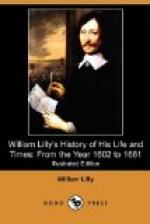His library of books came short of the world’s approbation, and were by his widow sold to Elias Ashmole, Esq. who most generously gave her[6] far more money than they were worth; but out of his respects unto the deceased and his memory, he most willingly paid her the money. He left behind him two sons and two daughters. He left in writing very little but his annual prognostications. He began first to write about the year 1630; he wrote Bellum Hibernicale, in the time of the long parliament, a very sober and judicious book: the epistle thereunto I gave him. He wrote lately a small treatise of Easter-Day, a very learned thing, wherein he shewed much learning and reading. To say no more of him, he lived an honest man, his fame not questioned at his death.
[Footnote 6: They cost me one hundred and forty pounds.]
In this year 1633, I became acquainted with Nicholas Fiske, licentiate in physick, who was born in Suffolk, near Framingham[7] Castle, of very good parentage, who educated him at country schools, until he was fit for the university; but he went not to the academy, studying at home both astrology and physick, which he afterwards practised in Colchester; and there was well acquainted with Dr. Gilbert, who wrote De Magnete. He came afterwards unto London, and exercised his faculty in several places thereof. (For in his youth he would never stay long in one house.) In 1633 he was sent for out of Suffolk by Dr. Winston of Gresham College, to instruct the Lord Treasurer Weston’s son in arithmetick, astronomy upon the globes, and their uses. He was a person very studious, laborious, of good apprehension, and had by his own industry obtained both in astrology, physick, arithmetick, astronomy, geometry and algebra, singular judgment: he would in astrology resolve horary questions very soundly; but was ever diffident of his own abilities: he was exquisitely skilful in the art of directions upon nativities, and had a good genius in performing judgment thereupon, but very unhappy he was, that he had no genius in teaching his scholars, for he never perfected any: his own son Matthew hath often told me, that where his father did teach any scholars in his time, they would principally learn of him; he had Scorpio ascending, and was secretly envious to those he thought had more parts than himself; however, I must be ingenuous, and do affirm, that by frequent conversation with him, I came to know which were the best authors, and much to enlarge my judgment, especially in the art of directions: he visited me most days once after I became acquainted with him, and would communicate his most doubtful questions unto me, and accept of my judgment therein rather than his own: he singularly well judged and directed Sir Robert Holborn’s nativity, but desired me to adjudge the first house, seventh and tenth thereof, which I did, and which nativity (since Sir Robert gave it me) came to your hands, and remains in your library; [oh learned Esquire!] he died about the seventy-eighth year of his age, poor.




